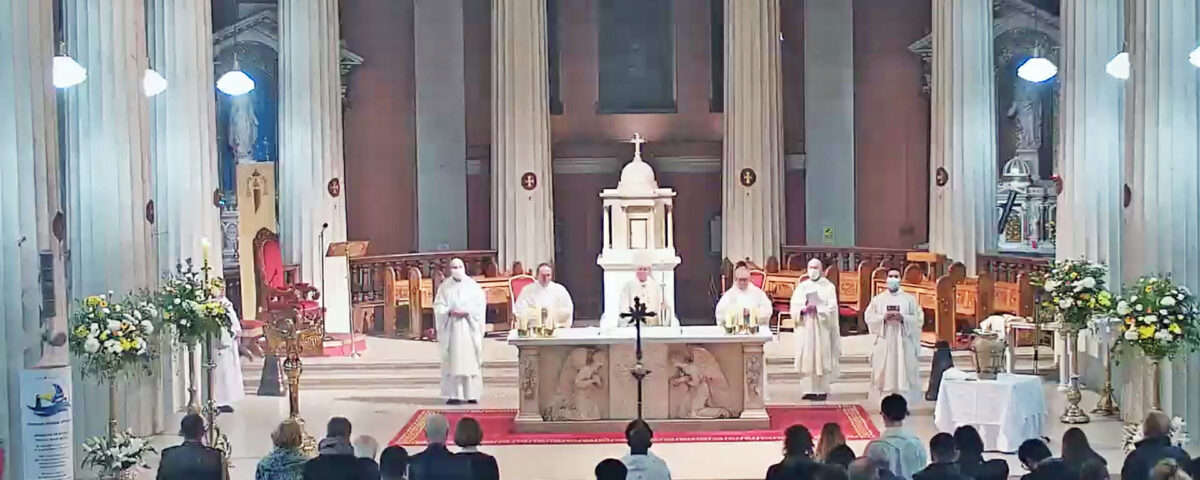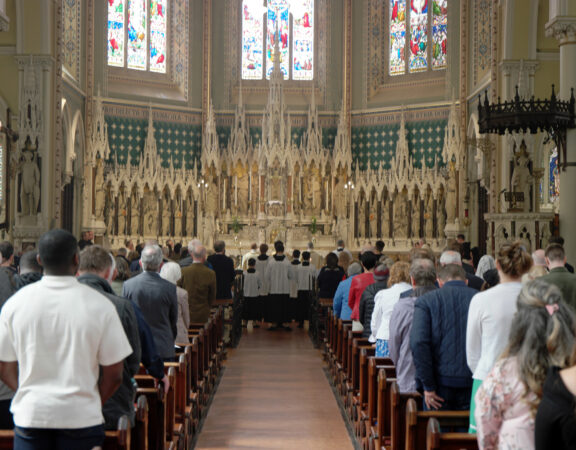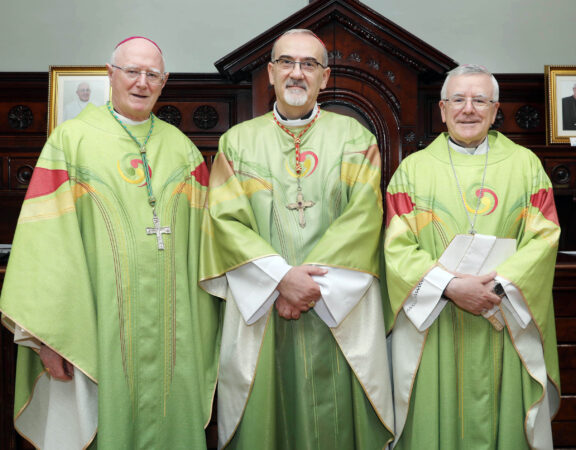Welcoming the stranger is the Resurrection in action! The essential support of the State and NGOs is no replacement for the concreteness and warmth of our love: how we welcome the stranger is the measure of our faith.
Easter Vigil 2022, St Mary’s Pro-Cathedral, April 16, 9pm
- Why do you seek the living one among the dead? He is not here… he has been raised.” (Luke 24:5)
My friends, in Holy Week we live anew—in ritual and symbol—the defining events of the life of Christ, not only to know them, but to make them our own; not merely to look at them, but to enter into them. Not just to recount what happened to our Lord, but to realise what happens to us. “Why do you seek the living among the dead? is far more a question about where we need to go and what we have to do, than a question about where we’ve come from. Amor Christi urget nos—the love of Christ empowers us to move forward (2 Cor 5:14)—is how St Paul captured the mystery into which we are called.
At the beginning of this week—on Palm Sunday—we read St Luke’s account of the passion and death of our Lord. Like every passion account, it tells of Jesus’ prayer in Gethsemane, and of his betrayal and arrest. Giving himself over to his captors, he says, “… but this is your hour and the power of darkness” (22:53). The Lord’s words are not only an expression of acceptance, but—like all his words—are words of prophecy. They reveal to us the nature of the world. “This is your hour, and the power of darkness.” We live in the ‘hour’ of the oppressor, in a time when the “power of darkness” holds sway not only in Ukraine, but in many parts of our world. You don’t need me to bring home to you the horror and darkness of these days … the graves of the innocent victims butchered in this “repugnant war,” and the victims of violence, despotism and hunger in so many other conflicts: let the horrors of recent weeks not blind us to the brutal conflicts in Yemen, or in Ethiopia.
“This is your hour, and the power of darkness,” or as St John puts it, “and it was night” (John 13:30). It is night right now. And in this night, we gather to proclaim that darkness and its power do not have the last word. Our Easter candles and the Exultet—our Easter song—proclaim that the light of the risen Christ overcomes the darkness of sin and death. In these days when darkness and death appear to reign, let us consider afresh, the significance of our faith in Christ’s victory over death, and its darkness, and what that means for how we live day-in-day out.
Saint Luke’s passion account is a story of many encounters: Jesus meets the disciples, Pilate, Herod, and the women of Jerusalem. But one of the most extraordinary encounters must be that between Jesus and the two wrongdoers crucified along with him. These two are every one of us! The so-called ‘bad’ thief and the ‘good’ thief are in every person, in the hearts of every person of faith. While one berates him, the other—knowing that death is unavoidable—turns to Jesus with an extraordinary request, an extraordinary prayer: “Jesus, remember me when you come into your Kingdom” (23:42).
Jesus answers with an even more extraordinary promise, “Today, you will be with me in Paradise” (23:43). Today! Today—this day, April 16, 2022—is the still the day Jesus is crucified. Crucified in the streets and villages of Ukraine—but crucified also in the streets and alleys of Dublin. Christ is mocked and beaten today: mocked in the cynicism and apparent untouchability of those who take advantage of the poor and the vulnerable, who use the weakness and disadvantage of others for their advantage and gain. Beaten: beaten today, this very night… prisoners, hostages, women and children in their own homes, and women and children trafficked. Christ is crucified today, this very hour.
But Christ is also raised today! In this Vigil tonight and in our hearts, God says death and destruction, are not the last word. “Today you will be with me …” are Jesus’ words to the “good thief.” And they are the Lord’s words to us. The women went to the tomb to attend to the body of the one they loved. But the one they loved was not there. “Why do you seek among the dead the one who is alive? He is not here, but he has been raised.” Trying to be faithful, we too return to where Jesus was. But he is not where he was! Christ has been raised, raised to life, raised into life, raised into our lives and into our hearts, raised into today.
The faithful Father has rescued his Son from the power of death, of darkness, and of sin. In rescuing him, He has rescued us—Christ’s sisters and brothers. It is this that the “Good Thief” somehow sees. This is the hope he places in Jesus who is crucified with him. Not a vain, naïve hope that they will all be taken down from their crosses, but a true hope that death is not God’s final word, that the darkness is not ultimate, and that violence, oppression, and sin do not hold sway.
This, my sisters and brothers, is the reality of the Resurrection. This Easter hope is the foundation and substance of our faith. As St Paul said in the Second Reading, “We know that Christ, raised from the dead, dies no more; death no longer has power over him” (Rom 6:9). Christ is risen this very night. The Resurrection is today! The Cross is today, but Christ is also raised today! Christ comes to life in our lives! Christ lives in our hearts. “We were indeed buried with him through baptism,” says Paul, “so that …we too might live in newness of life” (Rom 6:4).
Christ’s death is real. In his demeaning death, with all its horror, in its very annihilation, he embraced all that is dark and evil, all that is destructive and repulsive, and made it his own. “He descended into hell,” as we pray in the Creed. In raising him from the dead, his Father and ours, grabs hold of him—and in him—grabs hold of us, and hauls him and us from our lowest depths, and brings us into life. God hauls us into life. It is like a birth, and as you know, birth—for all its wonder—is not neat and tidy. It is painful and messy. So it is with the life God gives us. Christ’s passion and death took him to the lowest point of human existence, and from there, from that horrible place, the power of our faithful Father rescued him. Only God can do this. Only the Lord can save. Nobody can save themselves; this is what the “Good Thief” came to see! In refusing to meet evil with evil, in refusing to run from death, Jesus reveals the gentle, enduring, life-giving power of God, the God whose love is stronger than death (Song of Songs 8:6), the God whose power is revealed in weakness (2 Cor 12:9, cf. 1 Cor 1:17, 25).
This is our hope. This is our faith. In bringing Christ out of Hell, God brings us with him: out of all our hells: out of the hell of Bucha and the shameless murder of its defenceless people, out of the hell of slavery and trafficking, out of the hell of addiction and crime. This is the doorway to life—the narrow door of which Jesus speaks (Luke 13:24). It is no mere doctrine! It is the call to life, and its promise. It is the power to live in another way. It is power, because we are no longer alone. Christ now lives in our hearts and among us (Luke 17:21, cf. Gal 2:20). Through the Holy Spirit, God creates community among us—we who are fickle and frail; we who are sinners. The Spirit of the Risen Christ, poured into our hearts, overcomes our divisions, and draws us into mutual acceptance and forgiveness. This is the work of our faith, the road we are called to travel: a road, not of domination, but of service, a road of courage—which dares to say how things really are, a road of endurance—which stays true to what we’ve promised, a road of engagement that’s not afraid of disapproval or disdain, a road that knows what love is—and love’s cost, and a road that knows its limits, that has learned reliance on God. A road that is made real for us in how we now welcome our sisters and brothers from Ukraine. Welcoming the stranger is the Resurrection in action! Let us remember that the support of the State and NGOs is no replacement for the concreteness and warmth of our love. A welcome centre is a shelter, but not a home. You see, the Resurrection is not the end of Christ’s road, but the beginning of the second part of his journey (see Luke 24:13–53): the journey home to God, the journey home to us, and our journey home to each other, a journey without end: eternal life itself (see John 17:3).
On this Easter Night, may the Light shine—not just from our Easter candles, but from deep within our hearts—with its healing, its hope. May it brighten our way to each other, may it conquer our fear and mellow our harshness. May the power of the One whom God hauled out of death, bring us safely home.
A very happy and blessed Easter Season to you and all your loved ones on this life-filled day.







